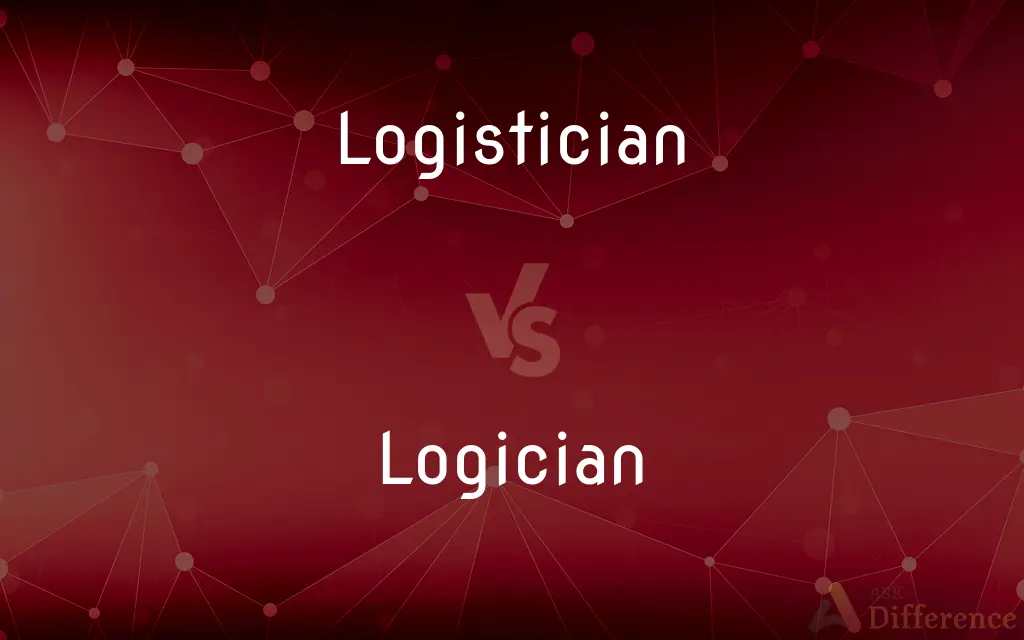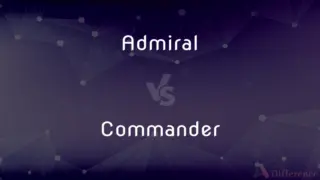Logistician vs. Logician — What's the Difference?
By Tayyaba Rehman — Updated on August 21, 2023
A logistician focuses on the coordination and movement of resources, while a logician specializes in the systematic study of valid reasoning and argument.

Difference Between Logistician and Logician
Table of Contents
ADVERTISEMENT
Key Differences
A logistician is primarily concerned with the organization and implementation of complex operations. Their role is paramount in sectors such as the military, production, or transport where they ensure that the right resources are at the right place at the right time. Conversely, a logician delves deep into the realm of philosophy and mathematics, analyzing and constructing valid arguments based on rules and principles of logic.
In business contexts, a logistician will work on supply chain management, inventory control, and transportation methods to ensure the smooth flow of goods and services. On the other hand, a logician will be found pondering on philosophical quandaries, formulating theorems, or teaching principles of reasoning in academic settings.
From an educational standpoint, a logistician might have a background in business, operations research, or supply chain management. Their training equips them to handle logistical challenges efficiently. A logician, however, often trains in philosophy, mathematics, or even computer science, equipping them with the tools to understand and create logical systems.
While both logisticians and logicians might employ structured thinking in their work, their applications diverge considerably. The former is entrenched in the pragmatic concerns of ensuring efficient operational flow, while the latter delves into abstract concepts, exploring the very nature of reasoning itself.
Comparison Chart
Area of Study
Coordination and movement of resources
Systematic study of valid reasoning and argument
ADVERTISEMENT
Common Job Settings
Military, transport, supply chain management
Academia, philosophy, computer science
Key Tools
Inventory systems, transport management software
Logical symbols, argument structures
Required Training
Business, operations research
Philosophy, mathematics
End Result
Efficient operational flow
Understanding and creating logical systems
Compare with Definitions
Logistician
A professional responsible for the efficient movement and storage of goods.
The company hired a skilled logistician to streamline their supply chain processes.
Logician
A scholar specializing in the study of logic.
The logician taught a course on deductive reasoning at the university.
Logistician
An expert in planning and coordinating complex operations.
During the disaster relief, the logistician ensured timely delivery of essential supplies.
Logician
An expert in valid reasoning and systematic argumentation.
Her skills as a logician were evident in every debate she participated in.
Logistician
Of or relating to logistics.
Logician
Someone trained in discerning the principles of valid inference.
As a trained logician, he could quickly identify the flaws in the speaker's argument.
Logistician
Someone trained in logistics, the branch dealing with the organization of resources.
The military logistician devised a plan for moving troops and equipment seamlessly.
Logician
A practitioner of a system of logic.
Logistician
A specialist in ensuring the right resources reach the right place at the right time.
As the company expanded globally, the role of the logistician became even more critical.
Logician
A thinker who applies rigorous criteria to ascertain the validity of statements.
The logician's paper on modal logic was well-received in academic circles.
Logistician
Of or relating to symbolic logic.
Logician
An individual versed in the methodology and nuances of logical systems.
Computer programmers often require the precision of a logician to write efficient code.
Logistician
A person involved with logistics.
Logician
A student or scholar of logic.
Logistician
A person skilled at symbolic logic.
Logician
A person who studies or teaches logic.
“To the logician all things should be seen exactly as they are.” ― “The Greek Interpreter”, by Sir Arthur Conan Doyle, 1894
Logistician
A person skilled at symbolic logic
Logician
A person skilled in logic.
Each fierce logician still expelling Locke.
Logistician
An individual skilled in the management of supply chain processes.
With the help of the logistician, the company reduced overhead costs and increased profits.
Logician
A person skilled at symbolic logic
Common Curiosities
What does a logistician do?
A logistician handles the coordination, movement, and storage of goods or resources, ensuring efficiency in supply chains and operations.
What does a logician do?
A logician studies and applies the principles of valid reasoning, often diving into philosophical or mathematical explorations of logic.
Do logicians have practical applications in the real world?
Yes, while logicians often engage in abstract thought, their insights can have practical applications, especially in areas like computer science, AI, and even in constructing clear, valid arguments in various fields.
What's the primary tool for a logistician?
A logistician often uses specialized software for inventory management, transportation, and supply chain coordination.
Do logicians work in the tech industry?
Yes, logicians can work in the tech industry, especially in areas like computer science where logical reasoning and formal systems are crucial.
Can a logistician work in academia?
While logisticians typically work in sectors like military or transport, they can also find roles in academia, particularly in departments related to supply chain management or operations research.
Is logistics only about transporting goods?
No, while transportation is a component, logistics, and by extension the role of a logistician, encompasses the entire process of moving and storing goods, from procurement to final delivery.
Do logisticians require certification?
While not always mandatory, certifications like the Certified Professional Logistician (CPL) can enhance a logistician's credentials and job prospects.
Do logicians only study classical logic?
No, logicians study various forms of logic, including classical, modal, and non-classical logic, each with its own set of principles and applications.
What's a fundamental tool for a logician?
A logician primarily relies on logical symbols and structured argumentation systems to study and create logical arguments.
Share Your Discovery

Previous Comparison
Epiblast vs. Hypoblast
Next Comparison
Admiral vs. CommanderAuthor Spotlight
Written by
Tayyaba RehmanTayyaba Rehman is a distinguished writer, currently serving as a primary contributor to askdifference.com. As a researcher in semantics and etymology, Tayyaba's passion for the complexity of languages and their distinctions has found a perfect home on the platform. Tayyaba delves into the intricacies of language, distinguishing between commonly confused words and phrases, thereby providing clarity for readers worldwide.
















































